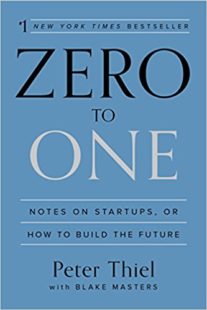
Zero to One
by Peter Thiel
⏱ 15 minutes reading time
🎧 Audio version available
Let’s start off by explaining the difference between radical innovation and incremental innovation.
Radical Innovation
Breaking chains, shattering expectations, and making a splash is what radical innovation is all about. Admittedly, it’s a far more complicated venture than incremental innovation. As suggested by the name, a radical approach isn’t about getting a slice of the “market cake,” cashing in on an already existing product by improving upon it.
Instead, it bakes an entirely different dessert, creating a new market and standing out from the crowd.
What are the advantages of this risky endeavor? There are many. You won’t have competition– or at least, not as much as you would if you were trying to stand out among competing companies.
As a startup, taking this approach could potentially be a huge win for you, as long as you maintain your pioneer status in the field.
In “The Innovator’s Dilemma,” by Clayton Christensen, he first introduced the term “disruptive innovation” in lieu of radical innovation. They mean the same thing. In the first stages, because your product is so new, so radical, you practically have an entire market to yourself, so you’re the one setting the rules and guidelines.
Most important, you’re setting the example for the profit. Especially during this time, new markets are wide open, welcoming further innovations and development.
This innovation can take form in two different ways. You may target areas of the market that are often overlooked. Or you may create an entirely new market where none exists, turning non-consumers into consumers.
What are some examples of radical innovation? Facebook, Netflix, Airbnb, Skype, and Uber. All these services and companies have one thing in common: they brought a new cake to the market, creating an entirely new product for consumers that they didn’t even realise they wanted.
Incremental Innovation
Incremental innovation is what most established companies do: focusing on creating new products and providing comfortable services. The goal here is to grow sales and increase profits for existing products and services, to create new business models while still developing current ones, and to protect existing business models.
This approach is popular because the risk associated with radical innovation isn’t as severe here. You’re not releasing a game-changer, just fixing glitches.
Incremental innovation also helps companies stay competitive. It allows them to profit from a product they’re already developing. And quite frankly, the ideas are easier to sell because customers are more used to a service that they already understand. That way, they’re willing to buy new improvements.
Affordability is a huge part of this approach. At this point, because you’re just improving on your existing products and services, you already have all the capital and resources you need to keep on innovating. It’s far easier to introduce new improvements rather than convince people to take a risk with a unknown product.
So the conclusion is that incremental innovation is great for companies who have resources, capital, and great human capital as well.
A perfect example to describe this sort of innovation is the smartphone industry. Not the original iPhone, which is an example of disruptive innovation, but rather how other companies followed its example, creating a huge market. Very quickly, companies released their own versions of smartphones; take advantage of an existing and needy industry.
It was a race for tech companies to deliver not just the next smartphone, but to improve it and release new generations of their models. At the same time, they were profiting wildly from previous ones.
And because these companies had the resources, capital, and human capital, they were able to improve their models step by step. Every year or so, they release a smartphone with new or better features; a better camera, more space, an additional camera, facial recognition, and so on. Because the wheel just keeps on turning, these companies remain relevant to the customers.
However, companies who employ this approach are only relevant until someone disrupts the market, which leads us to the disadvantages of each approach.
Disadvantages of Incremental Innovation
While we’re on the subject of incremental innovation, we have to point out its flaws. The whole concept of this approach is that you’re taking a slice of a cake that’s mostly devoured. Depending on the market, you may only find crumbs.
It’s harder to get noticed surrounded by others. Plus, expenses are likely to be mandatory because you’re not just trying to improve upon a service; you’re trying to remain competitive.
We just used the smartphone as an example. Now, think about a company like Nokia, whose name doesn’t hold nearly as much power as the newer, bolder, more innovative companies, like Apple and Samsung. Somewhere along the race, Nokia fell behind.
Toyota is another example, in the automotive business. However, they are ideal examples of companies that keep improving its existing products instead of making a new groundbreaking model.
Disadvantages of Radical Innovation
Now, also as the name suggests, this sort of approach is difficult. In order to be groundbreaking, a lengthy, risky process awaits you.
The timing has to be perfect. What you’re providing should be exactly what the market needs. And your product needs to be introduced and delivered to the right people at the right time.
Are you willing to deal with not having any clear return perspectives?
Having a market all to yourself doesn’t necessarily mean people will pay attention to it, so you’ll have to be on your A-game, putting extra effort in marketing, gathering resources, having the right connections, etc.
So, which of these two approaches is better for your startup? By listening to the definition of each one and some examples, you probably already have a good idea of what you want.
You can have the best of both worlds– but only one at a time. It’s always recommended that startups break into the business by offering something new. You may not even have enough resources to properly apply an incremental innovation yet– at least, not until your company reaches significant maturity.
In the first few stages, incremental innovation may not even be an option.
That’s not to say that you can’t take full advantage of this approach later on, after the new product’s presence is established in the market. You can start improving once you have feedback and consumer impressions. This way, you can stay competitive.
Radical innovation is the definition of a starting phase. How are you going to otherwise break into an overcrowded market? You can improve the product according to consumer feedback later.
So, how do you start? Start by researching the market to identify the problems that consumers face– rather than focusing on big problems. The key is thinking small and specific. The problem you find may be an issue with an existing product. With this knowledge, you can create a whole new product that addresses this issue.
Instead of focusing on the technology aspect, focus on the consumer; understand their needs and address them in the form of innovative products. Think of how much the world profited when the phone was merged with a camera to create an entirely new product!
That’s why it’s more interesting to go radical. So many opportunities are going to open up simply because mature markets don’t have room.
At the end of the day, which approach you take depends on your personal and business goal. Is your product powerful enough to compete with mature competitors? Are you willing to deal with sharing the profits? Then the steady rhythm of incremental innovation is the way to go.
Keep in mind that a new, disruptive competitor may rise up and knock you off the board.
But, if you are willing to take the risk, choosing radical innovation and developing something new may put you on the map. Just be prepared to deal with the potential fallout and challenges.
Neither of these approaches are free from challenges, but both can be incredibly rewarding. And one is better for your startup. It’s far easier to introduce new improvements in your products to keep being competitive, than to try to create a whole new market.
What Is Snapreads?

With the Snapreads app, you get the key insights from the best nonfiction books in minutes, not hours or days. Our experts transform these books into quick, memorable, easy-to-understand insights you can read when you have the time or listen to them on the go.


